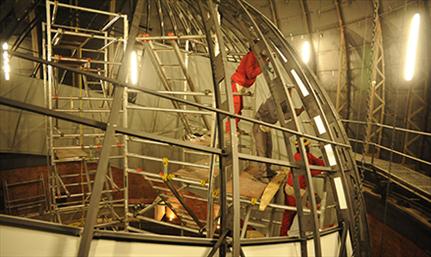Latest News Archive
Please select Category, Year, and then Month to display items
18 November 2024
|
Story Jacques Maritz
|
Photo Supplied
 Muhammad Cassim, a second-year student in the Department of Engineering Sciences in the Faculty of Natural and Agricultural Sciences.
Muhammad Cassim, a second-year student in the Department of Engineering Sciences in the Faculty of Natural and Agricultural Sciences.
Muhammad Cassim, a second-year student in the Department of Engineering Sciences in the Faculty of Natural and Agricultural Sciences at the University of the Free State, will participate in the winter university project in Pskov, Russia, from 25 November to 9 December 2024.
The winter school aims to strengthen relationships among young engineers and deepen international interaction via skills improvement, joint projects, and social cohesion. The programme boasts a densely packed education block, project block, and cultural block.
Cassim is part of the UFS Grid Related Research Group and actively participates in research centred on complexity science. He intends to complete his BSc Physics degree with Engineering subjects and progress towards postgraduate studies in the UFS Department of Physics.
He is currently working on verifying experimental developments in the field of synchronisation in complex networks. While he has already completed this high-performance computing training in his first year under the leadership of Albert van Eck (Director, UFS E-research), he is looking forward to the masterclasses in holographic modelling, deep learning, direct laser deposition, and database. Closely resembling his current research, he will have the opportunity to gain more experience in the use of set theory and graph theory in solving digital information processing problems.
For more information about international scholarships for study abroad opportunities, contact Mbali Moiketsi in the Office for International Affairs.
Cassim’s student profile is the culmination of the department’s strategy to produce young applied scientists who are subjected to the culture of research during their undergraduate study and could articulate with ease to other departments for postgraduate studies. The department aims to align with the UFS’ Vision 130 by producing competitive students who can operate in the postgraduate paradigm with the digital themes of veterinary science and ecological engineering science.
Interior dome of Naval Hill planetarium reaches completion
2013-09-04
|
 |
Work on the inside of the dome
Photo: Reinier Brönn
01 September 2013 |
The interior perforated aluminium planetarium dome has been installed by an American expert from Astro-Tec, the American company that customised the dome for the planetarium on Naval Hill. The planetarium, the first digital planetarium in sub-Saharan Africa, is scheduled to open in November 2013. The UFS manages the project.
The dome arrived in parts by ship from the USA in June 2013. These parts consisted of a number of long curved ‘ribs’ and numerous perforated panels. The panels were attached in sections to the ribs to form a smooth concave shell, creating the surface for the projection system.
The next step will be the installation of the projection system itself.
The 86-year old Lamont-Hussey Observatory on Naval Hill, also known as the Sterrewag Theatre, is home to the planetarium. The planetarium is the first component of a proposed Centre for Earth and Space. This will be a multi-purpose facility to promote science communication and preservation, and the arts.
This project is a long-term partnership between three main organisations, each bringing essential components to the project: the Mangaung Metro Municipality (MMM) as the land-owner, the Free State Department of Economic Development, Tourism and Environmental Affairs (DETEA) and the UFS, which developed the concept for the planetarium project and will be responsible for its operation and further fundraising endeavours.
The National Department of Science and Technology also joined this venture subsequent to providing substantial funding to the UFS in order to purchase the projection system for the planetarium.